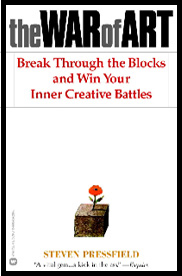I recently came across a book that challenged me a bit as a writer. It’s not new (the first copyright – the version I read – is 2002). But I found it relevant in my current efforts to spark my own creativity in fiction writing. After all, I spent most of my career in more analytical, “business-friendly” pursuits. The book is “The War of Art: Winning the Inner Creative Battle” by Steven Pressfield.
I don’t recall how I heard about this book. And it took me a while to get around to reading it. I skimmed through the book quickly. The main theme I picked up was that creative people use a host of excuses to forestall progress (a process he refers to as Resistance.) Ho, hum. But on the many occasions I was about to quit reading, Pressfield made a point, or offered a quote, or shared an anecdote that really made me stop and think.
My A-Ha Moments
I’d like to share a few of those “a-ha’ moments” with you. (As a side note, I got the most benefit from the middle section, a bit from the first, and the third section did not fit me quite as well. But I nevertheless recommend the book. To aspiring writers, designers and artists – particularly those who work freelance. To entrepreneurs. And to product managers for whom creativity is challenged by down-to-earth business demands.)
Characteristics of Creative Resistance
In the first section of the War of Art (Book One), he describes characteristics of Resistance, starting with procrastination. “Procrastination is the most common manifestation of Resistance because it’s the easiest to rationalize. We don’t tell ourselves, ‘I’m never going to write my symphony.’ Instead we say, ‘I am going to write my symphony: I’m going to start tomorrow.’”
We have all made similar decisions to defer progress to some better time in the future. And we have also become very efficient at justifying these decisions. I’m not ready. I don’t have what it takes. I’m too busy with urgent things. I haven’t found my inspiration. The kids are sick. I’m too tired. And the list goes on to infinity!
Combat Resistance in the War of Art
But in the second section (Book Two) Pressfield takes a stab at offering suggestions to combat Resistance. He starts by differentiating between the mindsets of amateurs and professionals. He relates being a pro to the basic principles of any job. His principles are:
- Show up every day.
- Show up no matter what.
- Stay on the job all day.
- Commit to the long haul.
- Accept that stakes are high and real.
- Accept remuneration for your labor.
- Don’t over-identify with your job.
- Master the technique of your job.
- Have a sense of humor about your job.
- Receive praise or blame in the real world.
Perfectionism can be a dilemma
I might word these ten principles a bit differently. But they forced me to think about whether I was approaching my own creativity from the mindset of a professional or an amateur (weekend warrior). I definitely leaned away from pro. I realized I was more apt to look at my writing (and creativity in general) as a sideline. That made it easier to rationalize scrapping time devoted to it and falling into a trap of perfectionism. And I kept waiting for the “right” time to come along. That’s why I appreciated Pressfield’s quote on this point:
“Someone once asked Somerset Maugham if he wrote on a schedule or only when struck by inspiration. ‘I write only when inspiration strikes,’ he replied. ‘Fortunately it strikes every morning at nine o’clock sharp.’”
Stop procrastinating
Yes, that quote really hit me. I realized I have to stop waiting – and waiting, and waiting — for inspiration to strike. Many other authors, in addition to Pressfield, have stressed the importance of writing every day to prime the pump for inspiration to happen. Yet for some reason this perspective was the boost I needed to stop procrastinating, and to stop rationalizing my procrastination. Creativity doesn’t happen on command per se. Yet you increase the likelihood of inspiration to happen if you practice creativity on an ongoing basis. (I won’t go so far as to make this my New Year’s resolution, but if that works for you, go for it!)
Even if your day job is to be creative – you are employed as a copywriter, graphic designer, artist – it might not command 100% of your time. As a result, the urgent demands of your job may take precedence over putting effort into originality.
Where does inspiration come from?
The final section (Book Three) of the War of Art provides a more metaphysical perspective on creativity. Where does inspiration come from? While this point can be debated ad nauseam (as it was in the Amazon reviews of the book), Pressfield cited several possible sources of the creative spark .Other people. Compiled data. Dreams. Intuition. Trends. Existing and anticipated products. And combinations of all of those. The main point to me is that creatives must be open to the new, open to the different, and open to the possibilities that exist all around us.

